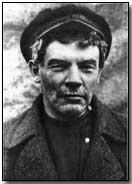Primary Documents - Lenin's Appeal for Revolt, 19 October 1917
 Reproduced below is the
text of a published appeal by Lenin, dated 19 October 1917 (1 November 1917
using the West's Gregorian calendar), in which he noted with satisfaction
increasing civil unrest among the Russian population. Lenin called for
further unrest as a means by which the Bolshevik cause could be advanced.
"We have no right to wait until the bourgeoisie has smothered the
Revolution" he argued.
Reproduced below is the
text of a published appeal by Lenin, dated 19 October 1917 (1 November 1917
using the West's Gregorian calendar), in which he noted with satisfaction
increasing civil unrest among the Russian population. Lenin called for
further unrest as a means by which the Bolshevik cause could be advanced.
"We have no right to wait until the bourgeoisie has smothered the
Revolution" he argued.
Lenin's call was ultimately successful; within a matter of days the Bolsheviks succeeded in seizing power, and with it brought about Russia's withdrawal from the war with the punitive (for Russia) Treaty of Best-Litovsk. Lenin issued numerous repeated calls urging civil unrest, culminating in his famed 'Call for Power' on 24 October 1917. Click here to view his appeal of 20 October 1917. Click here to view the Bolshevik's statement of demands dated 24 October 1917.
Appeal for Revolt Issued by Lenin, 19 October 1917
Facts prove to us most plainly that after the July days the majority of the population began rapidly to join the ranks of the Bolshevists.
This is proved by the elections at Petrograd on September 2nd, before the Kornilov affair, when the Bolshevist votes rose from 20 per cent to 33 percent, as also by the September elections of the district Dumas in Moscow, when the percentage of Bolshevist votes rose from 11 per cent to 49 per cent.
This was also proved by the fact that the bulk of the Peasants' Soviets, contrary to the advice of their "Avksentieff's" Central Soviet, declared against a coalition; for to be against a coalition is, in reality, to go with the Bolshevists.
Further, communications from the front with increasing frequency and definiteness show that the mass of the soldiery, in spite of malicious libels and attacks by the leaders of the Menshevists, the officers, deputies, etc., etc., more and more decisively came over to the side of the Bolshevists.
Finally, the most important fact in the present juncture is the Peasants' Rising. These are the object lessons which prove the passing of the population to the side of the Bolshevists. The movement of the peasants in the Tamboff Government was a revolution, both in a physical and political sense, which gave such important political results as, in the first place, the consent to transfer the land to the peasants.
Not without cause does the whole of the riff-raff Press, up to the Delo Naroda, now wail of the need to hand over the land to the peasants. Here you have the proof of the soundness of Bolshevism and of its success.
Another splendid political and revolutionary consequence of the Peasants' Rising is the arrival of grain at the railway stations in the Tamboff Government. Here, perplexed comrades, is another argument in favour of a rising as the only means of saving the country from famine, which is already knocking at the door, and from a crisis of unheard-of proportions.
Whilst the Menshevist traitors to the people growl, threaten, write resolutions, and hold out the empty convocation of the Constituent Assembly, the people will proceed by Bolshevist tactics with the settlement of the food question by a rising against the landed proprietors, capitalists, and middlemen.
No, to doubt now that the bulk of the people is going, and will continue to go, with the Bolshevists is shamefully to hesitate and tantamount to throwing over all principles of proletarian revolutionism and totally to repudiate Bolshevism.
We have no right to wait until the bourgeoisie has smothered the Revolution. The famine does not wait. The Peasant Rising did not wait. The war does not wait. History does not repeat itself, but, if we turn our backs on it, what will happen?
We must wait for a miracle.
Source: Source Records of the Great War, Vol. V, ed. Charles F. Horne, National Alumni 1923
Britain introduced conscription for the first time on 2 February 1916.
- Did you know?
